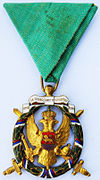
The Greens' leader Krsto Popović

The flags used by the Greens in Gaeta.
The Greens (Montenegrin language: Zelenaši/Зеленаши) were a group of Montenegrin separatists, most notable for instigating the Christmas Uprising of 1919, and for trying to re-establish the Kingdom of Montenegro as an Axis client state during World War II.[1]
Characteristics[]
The Greens drew their membership from the highland tribes (Moračani, Piperi, and Rovci), the Katun clans (Bjelice, Cetinje, Cveto, and Cuce), and the Herzegovinian tribes (Nikšići and Rudinjani).[2] They declared themselves as Serbs.[3] They originally existed from 1918 to 1926 in Montenegro in the newly established Kingdom of Serbs, Croats, and Slovenes, when they supported the House of Petrović-Njegoš of Montenegro over the House of Karađorđević of Serbia, and were opposed to the mode and manner in which the south Slavic unification was implemented, resulting in the disappearance of Montenegro as a political entity.
Greens tended to emphasize the key role of Montenegro in Slavhood and many favoured a federal Yugoslavia. Notable leaders of the Greens included Krsto Zrnov Popović,[4] Jovan S. Plamenac and Novica Radović.
Greens re-gathered during World War II, under the command of Krsto Zrnov Popović who in turn acted under the auspices of fascist Italy. They were organized into military unit called the Lovćen Brigade featuring four brigades that participated in the chaotic civil war raging on the ground in Montenegro and whose military activity was mostly directed against the communist Partisans. After their military defeat, most of the surviving Greens members joined the Partisans, with some joining the Ustaše and a minority joining the Chetniks.
Name[]
The name of the Greens derives from the green voting cards that were used by the supporters the Kingdom of Montenegro at the Podgorica Assembly in 1918.
History[]
Christmas Uprising[]
The Greens opposed the unification of the Kingdom of Montenegro with the Kingdom of Serbia under the House of Karađorđević. With support from Italy, the Greens organised an uprising in 1919 with the aim of bringing the House of Petrović-Njegoš back to the Montenegrin throne. The rebellion failed and the rebels fled to Italy. Krsto Zrnov Popović and Novica Radović lead the uprising, along with Commander Savo Čelebić and Captain Đuro Drašković.
After the unsuccessful uprising, the Greens returned, starting a guerrilla war against Serb hegemony in June. The core of the revolt was subdued in 1922-1923, but low-level guerrilla resistance continued in the highlands for several more years. In 1922, Green leader Sekula Drljević founded the Montenegrin Federalist Party.
By 1926, most remaining forms of armed resistance ended. However, a few groups (most notably the militia led by Savo Raspopović) continued engaging in skirmishes until 1929. Reportedly, the last rebel to lay down his arms did so on the promise that he would receive a sabre and medal from King Alexander I of Yugoslavia.[citation needed]
World War II and their end[]
In World War II, the Greens were organized yet again in Montenegro under the command of the Fascist Italy. Drljević was put in power and proclaimed the re-establishment of the Kingdom of Montenegro, but was immediately ousted by the July uprising of local Partisans and Chetniks. Among the Montenegrin federalists, Krsto Zrnov Popović returned from exile in Italy to attempt to lead the Greens. The Greens' forces were called the Lovćen Brigade. Soon, they were disorganized and one group of Greens joined the Partisans, while another joined the Ustaše and some joined the Chetniks.
After the Partisan victory in 1945, many leaders of the Greens were killed as the collaborators of the Italian occupation: the same Popović was murdered in 1947. At the same time, the Communists were killing many potential opponents all over Yugoslavia. This marked the end of the Greens.
Order of Freedom of Montenegro[]

Order of Freedom
The Order of Freedom of Montenegro was issued by the exiled King Nikola in January 1919. This order was mainly dedicated to the Greens.
See also[]
- True People's Party
- Montenegrin Federalist Party
- Italian governorate of Montenegro
Notes[]
- ↑ Roberts 1987, p. 24.
- ↑ Banac, Ivo (March 1988). The national question in Yugoslavia: origins, history, politics. Cornell University Press. p. 285. ISBN 9780801494932. https://books.google.com/books?id=KfqbujXqQBkC&pg=PA285. Retrieved 17 November 2011.
- ↑ Banac, Ivo (1992). "Protiv straha : članci, izjave i javni nastupi, 1987-1992" (in Croatian). Zagreb: Slon. p. 14. OCLC 29027519. https://books.google.rs/books?ei=c8_lToWQF4yrsgaejLTBCQ&ct=result&id=uJBpAAAAMAAJ&dq=zelena%C5%A1i+su+srbi&q=%22+Posebno+je+zanimljivo+da+su+se+i+%C2%BBzelena%C5%A1i%C2%AB%2C+kao+beskompromisna+opozicija%2C+nacionalno+smatrali+Srbima%22#search_anchor. Retrieved 12 December 2011. "Posebno je zanimljivo da su se i »zelenaši«,...., nacionalno smatrali Srbima" [it is especially interesting that Greens also ... declared themselves as Serbs]"
- ↑ Popovic biography
References[]
- Roberts, Walter R. (1987). Tito, Mihailović and the Allies: 1941–1945. New Brunswick, New Jersey: Duke University Press. ISBN 978-0-8223-0773-0. https://books.google.com/books?id=43CbLU8FgFsC.
External links[]
- Who Were the Greens
- The Greens from 1918 to 1945
- Order of Freedom of Montenegro
- Novak Adžić: Montenegrin Greens (Montenegrin)
- Krsto Zrnov Popovic, the leader of Zelenasi (Montenegrin)
The original article can be found at Greens (Montenegro) and the edit history here.